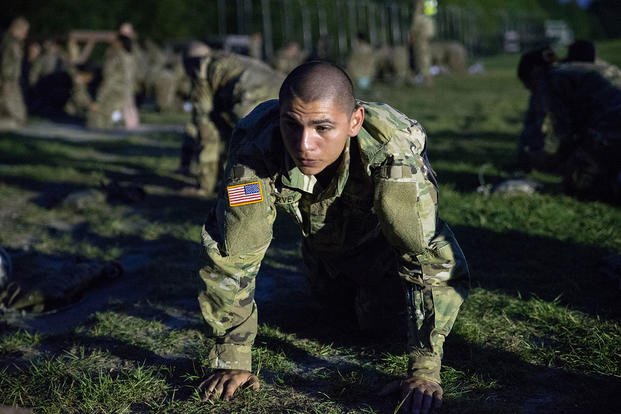A new study of British infantry recruits suggests a recruit's success in basic training relies not just on physical ability but an often-overlooked psychological profile. In other words, your success as a military recruit may be a trait you were born with.
However, you can also develop into a high-performing military recruit and become a successful soldier, Marine, airman or sailor -- even if you enlist without being naturally aggressive, outgoing or exceptionally athletic.
Some recruits may seem like perfect candidates for the rigors of military life. But those who train diligently and make an effort to learn have an equal chance of success.
The 2025 Military Psychology study identified key characteristics that distinguish recruits who successfully complete basic training on their first attempt from those who do not.
To improve your chances of success, focus on developing these key traits and skills:
Mental Toughness and Aggression
The study found that recruits with higher psychoticism scores -- marked by traits like tough-mindedness, controlled aggression, and mental resilience -- tend to perform better.
Psychoticism, in the context of personality psychology, refers to a personality dimension characterized by traits like toughness, aggression and impulsiveness. As with any psychological trait, there is a spectrum. While often incorrectly used interchangeably with "psychotic," psychoticism is a personality trait and is not the same as psychosis, which is a mental disorder involving a disconnection from reality.
Higher psychoticism scores, in this context, refer to tough-mindedness and controlled aggression, which are beneficial for recruits.
Put simply, your ability to perform under fatigue and pressure is critical. Find habits, like fitness or studying for school, sports or public speaking, that push you beyond your comfort zone daily. Engaging in these types of activities, even when you don't feel like it, is the pathway to developing this type of mindset.
Ability to Manage Anxiety and Foster Emotional Stability
Lower neuroticism correlates with greater success for recruits, the study suggests. This means that recruits who exhibit less anxiety and emotional instability are more likely to thrive.
If you want to build emotional resilience, it will be helpful for you to practice stress management techniques such as mindfulness and breathing exercises. This will help you maintain focus and composure in challenging circumstances.
Neuroticism is a personality trait that has a spectrum characterized by a tendency to experience negative emotions like anxiety, anger and depression. Individuals low in neuroticism are less likely to exhibit emotional instability and irritability, and they are less likely to dwell on negative aspects of situations.
Enhanced Focus and Motivation
Another crucial element is attention control. Also known as concentration or executive attention, it's the ability to selectively focus on specific stimuli and ignore others. This is the trait that helps you prioritize relevant information for goal-directed behavior. It's vital for tasks that involve maintaining goals, resolving conflicts, and engaging in complex thinking and planning processes that require teamwork.
Recruits who concentrate and act even when motivation wanes have a higher success rate. Create a personal environment and daily schedule that minimizes distractions and focuses on routines that reinforce your ability to stay locked on, especially during challenging moments.
Techniques such as building habits and schedules, reducing distractions, getting sufficient sleep, and practicing focused attention can help enhance attention control.
Maturity Matters
Most military recruits are teenagers, which means some are not fully developed in terms of physical, mental and/or emotional maturity. Older recruits' life experience usually translates into greater emotional resilience. Use this to your advantage by reflecting on past challenges and the lessons learned.
If you are a teenager considering a career in service, do not rush to join, especially if the field you are interested in has a high attrition rate during its selection process. Most attrition rates are among ill-prepared teens.
Traits such as core values and extraversion were found to be less predictive of success than anticipated. However, over the 26-week training course, recruiters noted significant personal growth among applicants who were exposed to core values for the first time. Recruits also became more extroverted and experienced a decrease in anxiety and shifted their motivation from seeking external approval to achieving the mission.
The takeaway: Personality traits you exhibit on your first day of training are important, but equally significant is your capacity for growth and adaptation. By focusing on mental toughness, emotional stability and other key attributes, you can enhance your performance and succeed as a military recruit.
Ready to elevate your potential as a military recruit? Dive into the Military.com Fitness Section and uncover strategies backed by the latest psychological and physiological research, and experience. Equip yourself with the tools to become tough-minded, emotionally resilient, and more focused on team goals. Don't just train -- transform your mindset and be the best recruit you can be.
Study details: Beattie, S., Du Preez, T., Hardy, L., & Arthur, C. (2025). What do you bring to the table? Exploring psychological attributes that predict successful military training. Military Psychology, 37(1), 50–61.
Want to Learn More About Military Life?
Whether you're thinking of joining the military, looking for fitness and basic training tips, or keeping up with military life and benefits, Military.com has you covered. Subscribe to Military.com to have military news, updates and resources delivered directly to your inbox.


















